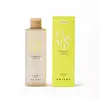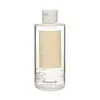What's inside
What's inside
 Key Ingredients
Key Ingredients

 Benefits
Benefits

 Concerns
Concerns

 Ingredients Side-by-side
Ingredients Side-by-side

PEG-6 Caprylic/Capric Glycerides
EmulsifyingDipropylene Glycol
HumectantC12-14 Alketh-12
EmulsifyingEthylhexylglycerin
Skin ConditioningDisodium EDTA
Niacinamide
SmoothingSolanum Lycopersicum Fruit Extract
AntioxidantButylene Glycol
HumectantCitrus Limon Peel Oil
MaskingRosmarinus Officinalis Leaf Oil
MaskingCitrus Paradisi Fruit Extract
Skin ConditioningCitric Acid
BufferingSodium Citrate
BufferingAbies Sibirica Oil
MaskingCymbopogon Schoenanthus Oil
MaskingPEG-6 Caprylic/Capric Glycerides, Dipropylene Glycol, C12-14 Alketh-12, Ethylhexylglycerin, Disodium EDTA, Niacinamide, Solanum Lycopersicum Fruit Extract, Butylene Glycol, Citrus Limon Peel Oil, Rosmarinus Officinalis Leaf Oil, Citrus Paradisi Fruit Extract, Citric Acid, Sodium Citrate, Abies Sibirica Oil, Cymbopogon Schoenanthus Oil
Water
Skin ConditioningDipropylene Glycol
HumectantGlycerin
HumectantPropanediol
Solvent1,2-Hexanediol
Skin ConditioningDecyl Glucoside
CleansingPolyglyceryl-4 Caprate
EmulsifyingEthylhexylglycerin
Skin ConditioningCitric Acid
BufferingDisodium EDTA
Sodium Hyaluronate
HumectantCeramide NP
Skin ConditioningPhytosterols
Skin ConditioningSea Water
HumectantTocopherol
AntioxidantGlycine
BufferingSerine
MaskingGlutamic Acid
HumectantAspartic Acid
MaskingLeucine
Skin ConditioningAlanine
MaskingLysine
Skin ConditioningArginine
MaskingTyrosine
MaskingPhenylalanine
MaskingProline
Skin ConditioningThreonine
Valine
MaskingIsoleucine
Skin ConditioningHistidine
HumectantCysteine
AntioxidantMethionine
Skin ConditioningWater, Dipropylene Glycol, Glycerin, Propanediol, 1,2-Hexanediol, Decyl Glucoside, Polyglyceryl-4 Caprate, Ethylhexylglycerin, Citric Acid, Disodium EDTA, Sodium Hyaluronate, Ceramide NP, Phytosterols, Sea Water, Tocopherol, Glycine, Serine, Glutamic Acid, Aspartic Acid, Leucine, Alanine, Lysine, Arginine, Tyrosine, Phenylalanine, Proline, Threonine, Valine, Isoleucine, Histidine, Cysteine, Methionine
 Reviews
Reviews

Ingredients Explained
These ingredients are found in both products.
Ingredients higher up in an ingredient list are typically present in a larger amount.
Citric Acid is an alpha hydroxy acid (AHA) naturally found in citrus fruits like oranges, lemons, and limes.
Like other AHAs, citric acid can exfoliate skin by breaking down the bonds that hold dead skin cells together. This helps reveal smoother and brighter skin underneath.
However, this exfoliating effect only happens at high concentrations (20%) which can be hard to find in cosmetic products.
Due to this, citric acid is usually included in small amounts as a pH adjuster. This helps keep products slightly more acidic and compatible with skin's natural pH.
In skincare formulas, citric acid can:
While it can provide some skin benefits, research shows lactic acid and glycolic acid are generally more effective and less irritating exfoliants.
Most citric acid used in skincare today is made by fermenting sugars (usually from molasses). This synthetic version is identical to the natural citrus form but easier to stabilize and use in formulations.
Read more about some other popular AHA's here:
Learn more about Citric AcidDipropylene Glycol is a synthetically created humectant, stabilizer, and solvent.
This ingredient helps:
Dipropylene glycol is technically an alcohol, but it belongs to the glycol family (often considered part of the ‘good’ alcohols). This means it is hydrating and gentle on skin unlike drying solvent alcohols like denatured alcohol.
As a masking agent, Dipropylene Glycol can be used to cover the smell of other ingredients. However, it does not have a scent.
Studies show Dipropylene Glycol is considered safe to use in skincare.
Learn more about Dipropylene GlycolDisodium EDTA plays a role in making products more stable by aiding other preservatives.
It is a chelating agent, meaning it neutralizes metal ions that may be found in a product.
Disodium EDTA is a salt of edetic acid and is found to be safe in cosmetic ingredients.
Learn more about Disodium EDTAEthylhexylglycerin (we can't pronounce this either) is commonly used as a preservative and skin softener. It is derived from glyceryl.
You might see Ethylhexylglycerin often paired with other preservatives such as phenoxyethanol. Ethylhexylglycerin has been found to increase the effectiveness of these other preservatives.